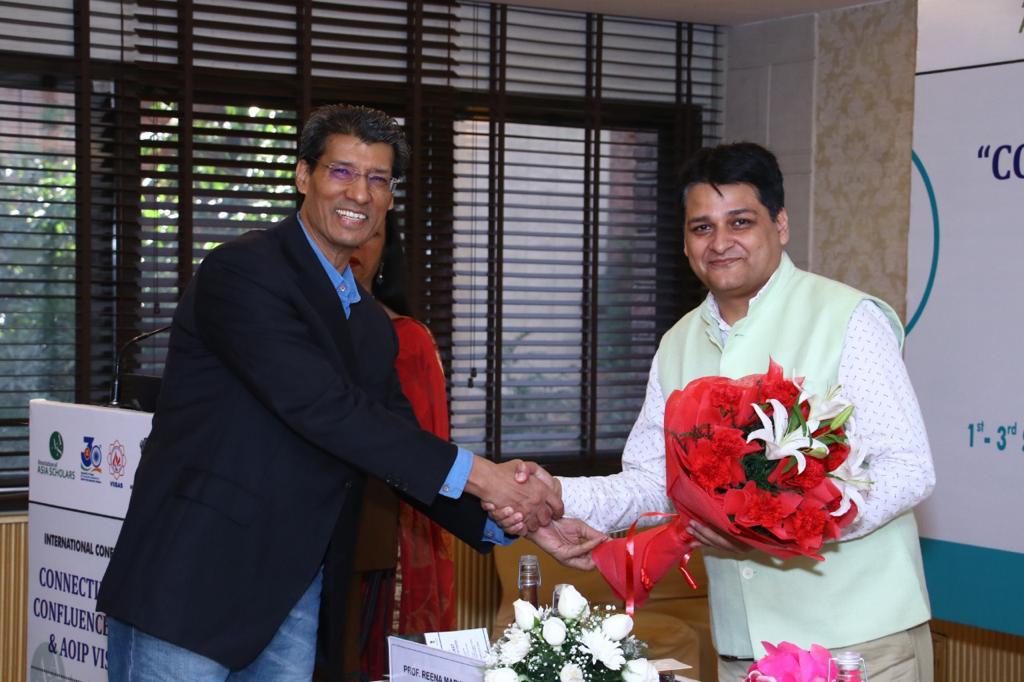
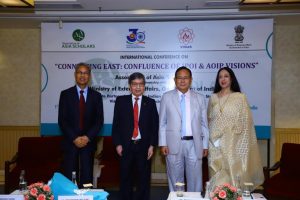
CONNECTING EAST : CONFLUENCE OF IPOI AND AOIP VISIONS
2022
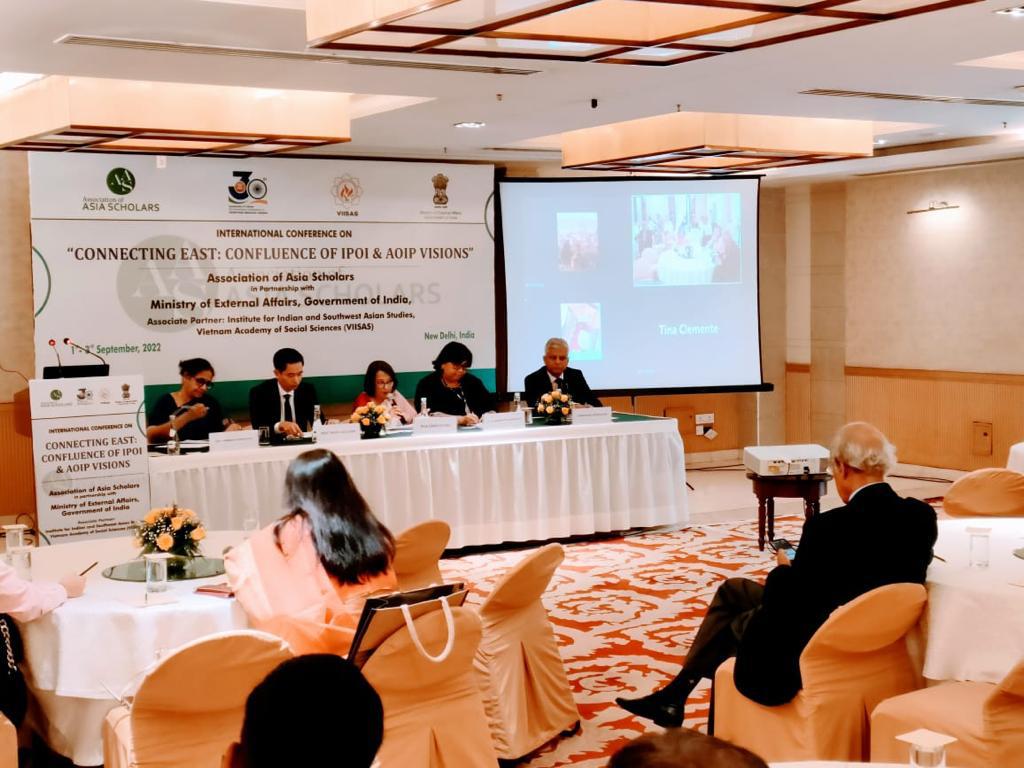
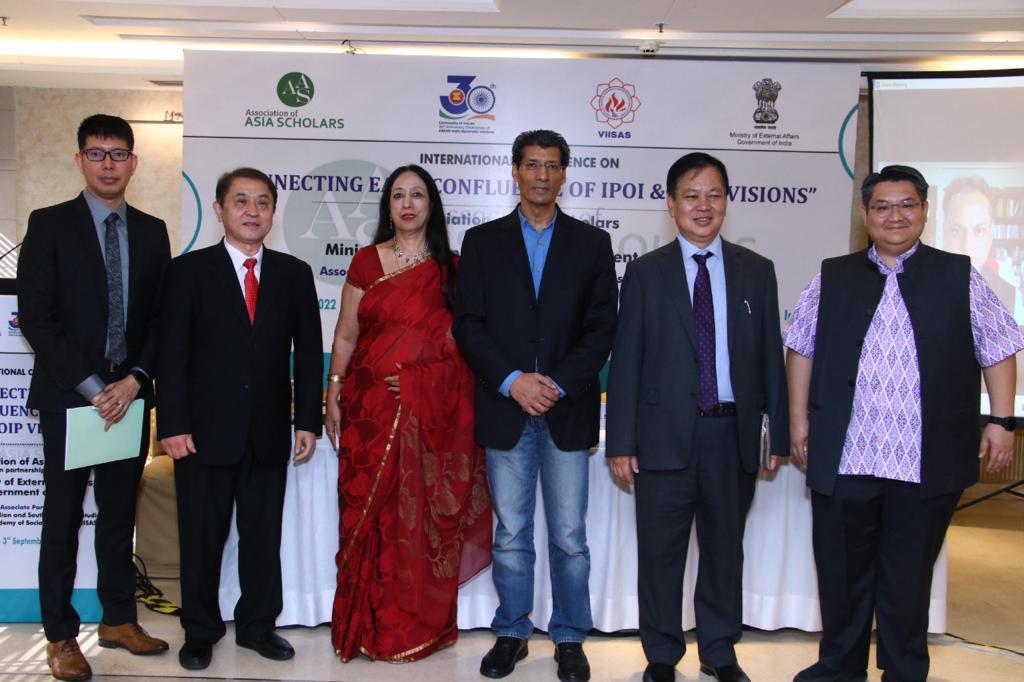
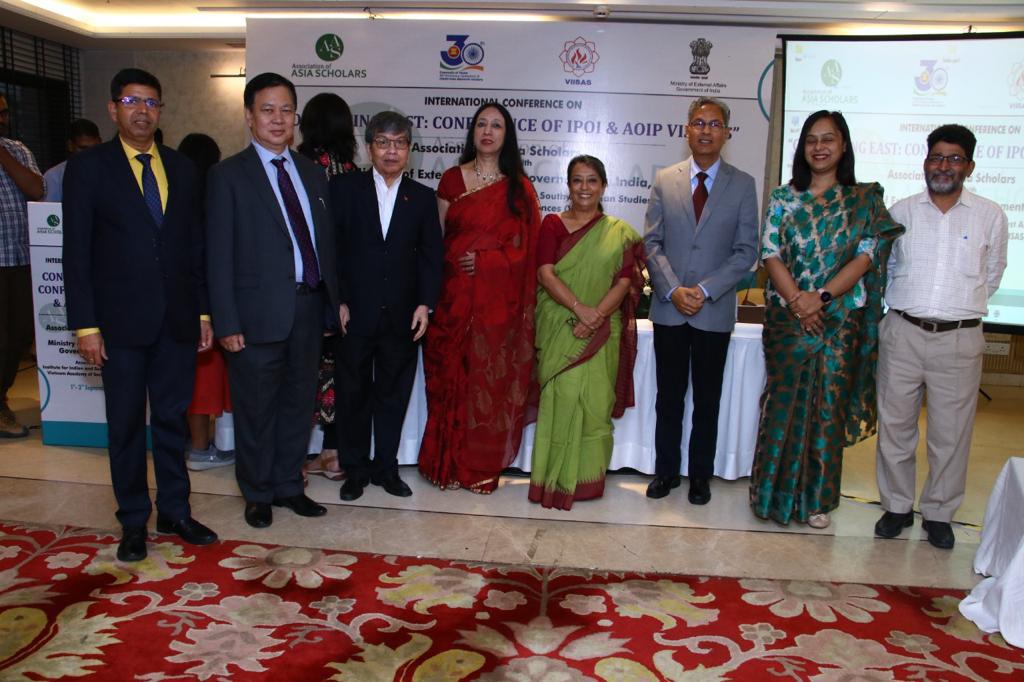
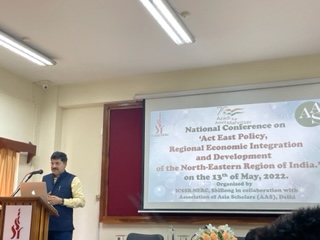
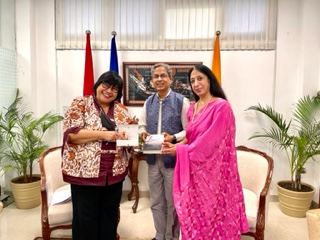
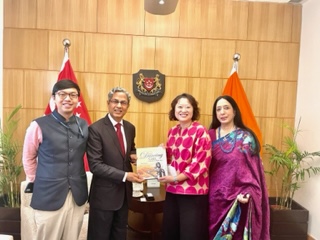
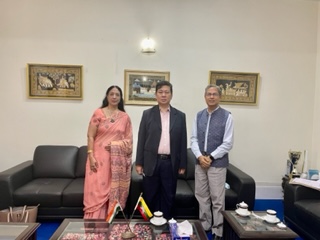











Sanjay Kumar Bhardwaj is Chairperson & Professor Centre for South Asian Studies, School of International Studies, JNU. His Areas of Specialization include India’s Foreign Policy with special reference to its Neighbours (Bangladesh, Pakistan, Nepal, Sri Lanka, Afghanistan and China), Bangladesh: Identity, Politics and Foreign Policy issues, South Asia: History of Partition, Identity, Religion, South Asia: Politico-Security, Socio-Cultural Issues. He is the recipient of several awards and fellowships.
Sharad Kumar Soni is a Professor, Centre for Inner Asian Studies, School of International Studies His research interests include Mongolian, Central Asian and Inner Asian Studies with a focus on history, culture, ethnicity, politics and international relations of Mongolia, Kazakhstan as well as Tibet and Inner Mongolia Autonomous Regions of China, apart from issues concerning Mongol culture areas of Siberian Republics of Tuva and Buryatia.
Sanjay Sharma is Professor with Ambedkar University, Delhi. He is a historian, translator and media practitioner. He was educated in Allahabad University (B.A.), Jawaharlal Nehru University (M.A.), Delhi University (M.Phil) and School of Oriental and African Studies, University of London (Ph.D). He has researched on aspects of famine, relief, food security, drought, environmental degradation, state welfarism and philanthropy in modern India. He is also interested in issues of poverty, hunger, diet, disease, malnutrition, health and medicine in the colonial period. His wider areas of interest include state formation, popular culture, language and media in northern India. He has been engaged with comparative histories of India, China and Europe.
Reena Marwah is Professor, Jesus and Mary College, University of Delhi, India. Her research interests include international relations, international business and politics of globalization. She was an ICSSR Senior Fellow, MHRD, Govt. of India, from June 2017 to May, 2019 and a Senior Academic Consultant with ICSSR for three years. She is the recipient of several awards and fellowships (including the Robert McNamara fellowship of the World Bank in 1999 and the Asian Scholarship Foundation fellowship in 2002. Her latest book (March 2020), Re-imagining India-Thailand Relations: A Multilateral and Bilateral Perspective, has been published by World Scientific Publishers, Singapore.
Sukhpal Singh is with the Centre for Management in Agriculture (CMA), IIM, Ahmedabad. He has eight books including the recent ones on fresh food retail chains in India (2011), Modern food value chains in India (2012), and producer companies (2014), and has published more than 100 research papers in international/national journals/edited books, and 50 review articles/articles in popular dailies/magazines. He was a visiting fellow at the IDS, Sussex (Brighton), UK, Chulalongkorn University, Bangkok, Thailand, and the University of Manchester; UK.
Lakhwinder Singh is Professor of Economics and Head, Department of Economics, Punjabi University, and Coordinator, Centre for Development Economics and Innovations Studies (CDEIS), Punjabi University. His research interests include development Economics, Systems of Innovation, Human Development and Knowledge-Economy, Rural-Urban Migration, Area Studies (Punjab, India, South Korea, Asia and BRICS). He is the recipient of several awards and fellowships and has published extensively.
Sangeeta Thapliyal, is a Professor at the Centre for Inner Asian Studies, School of International Studies and is currently an ICCR Chair professor in Spain. She works on strategic issues concerning South Asia with a special reference to Nepal. Her areas of research include Water Security in South Asia and Regional Cooperation. Her previous work experience includes the Director, Department of Strategic and Regional Studies, University of Jammu, Observer Research Foundation, Delhi Policy Group and the Institute of Defence and Strategic Studies.
B. R. Deepak is a Professor of Chinese and China Studies at the Centre of Chinese and Southeast Asian Studies, Jawaharlal Nehru University, New Delhi, India. He is the recipient of many scholarships and awards and has published extensively. He is the author of India and China 1904-2004: A Century of Peace and Conflict (2005), China: Agriculture, Countryside and Peasantry (2010), and Chinese Poetry: From 11th Century BC to 14th Century AD for which he has won China Special Book Award in 2011; India-China Relations: Civilizational Perspective (2012); India-China Relations: Future Perspectives (2012).
Swaran Singh is Professor for Diplomacy and Disarmament at Centre for International Politics, Organization and Disarmament (CIPOD), School of International Studies, Jawaharlal Nehru University (New Delhi). He is President of Association of ASIA Scholars, General Secretary of Indian Association of Asian & Pacific Studies, Guest Professor at Research Institute of Indian Ocean Economies, Yunnan University of Finance and Economics (China) and Advisory Board Member of Atlanta-based Communities Without Borders Inc. (United States). He has numerous publications to his credit.
Dr. E. Sridharan is the Academic Director of the University of Pennsylvania Institute for the Advanced Study of India (UPIASI) in New Delhi. He is a political scientist with research interests in comparative politics and political economy of development, party systems and coalition politics, and international relations theory and conflict resolution in South Asia.
Patricia Uberoi is currently Chairperson and Honorary Fellow of the Institute of Chinese Studies (ICS), Delhi. A sociologist by training, Dr Uberoi has taught Sociology at the University of Delhi and the Jawaharlal Nehru University, New Delhi, and retired as Professor of Social Change and Development at the Institute of Economic Growth, Delhi. Her research interests centre on aspects of family, kinship, gender, popular culture and social policy in respect to both India and China.
Ambassador (Retd.) Sudhir T. Devare is a former Indian diplomat who joined the Indian Foreign Service (I.F.S) in 1964. He has worked in several Indian embassies abroad such as Moscow, Washington, Geneva and Myanmar. As Secretary in Ministry of External Affairs (1998-2001) he was closely associated with the evolution and implementation of India’s Look East policy as well as multilateral economic relations with the world. He was a member of the National Security Advisory Board in 2002-03. He was also a Visiting Professor at the Centre of East Asian Studies, Jawaharlal Nehru University. He has held several positions of eminence, including the position of Director-General of the Indian Council of World Affairs from 2009-2012.
Prasenjit Duara is the Oscar Tang Chair of East Asian Studies at Duke University. He was born and educated in India and received his PhD in Chinese history from Harvard University. He was previously Professor and Chair of the Dept of History and Chair of the Committee on Chinese Studies at the University of Chicago (1991-2008). Subsequently, he became Raffles Professor of Humanities and Director, Asia Research Institute at National University of Singapore (2008-2015). He has published extensively.
Wang Gungwu (b. 9 October 1930, Surabaya, Indonesia–) is an internationally renowned historian famed for his scholarship on the history of the Chinese diaspora in Southeast Asia, as well as the history and civilisation of China and Southeast Asia. In his illustrious academic career, Wang has held eminent appointments in various universities and organisations around the world. He is currently a professor emeritus at the Australian National University, and a University Professor at the National University of Singapore (NUS), the highest academic title conferred by NUS. He was the Chairperson of the ASF.